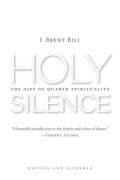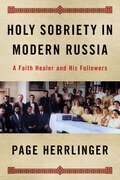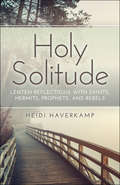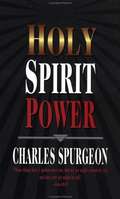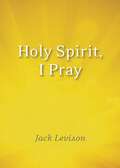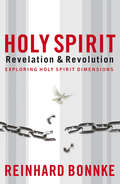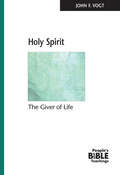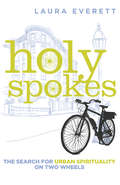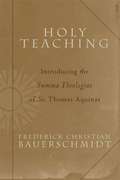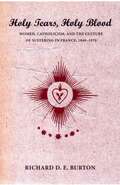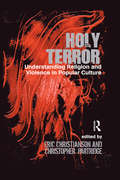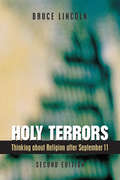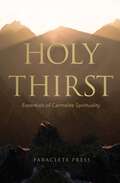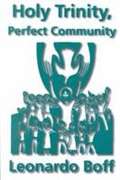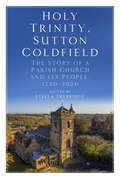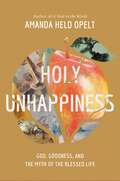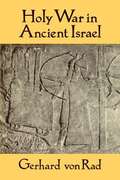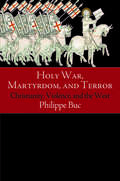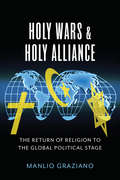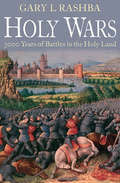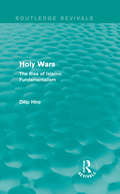- Table View
- List View
Holy Silence: The Gift Of Quaker Spirituality, 2nd Ed
by J. Brent BillAn invitation to experience more fully the life-changing power of sacred silence For over a decade, J. Brent Bill's Holy Silence has been regarded as a contemporary classic on sacred silence. With warmth, wisdom, and gentle humor, Bill presents the Quaker practice of silence and expectant listening to a wider Christian audience. FEATURESRevised and expanded editionIncludes new spiritual silence practicesNew section on incorporating holy silence into worshipWritten by one of the most respected interpreters of the Quaker traditionIntroduces a fresh way of connecting with God
Holy Silence: The Gift Of Quaker Spirituality, 2nd Ed
by J. Brent BillAn invitation to experience more fully the life-changing power of sacred silence For over a decade, J. Brent Bill's Holy Silence has been regarded as a contemporary classic on sacred silence. With warmth, wisdom, and gentle humor, Bill presents the Quaker practice of silence and expectant listening to a wider Christian audience. FEATURESRevised and expanded editionIncludes new spiritual silence practicesNew section on incorporating holy silence into worshipWritten by one of the most respected interpreters of the Quaker traditionIntroduces a fresh way of connecting with God
Holy Smokies: The Real Centurions
by Al Palmquist Joyce HovelsWhen a man of faith dares to stand in the streets of a large city where criminals lurk and lawlessness abounds, when he dares proclaim to those he encounters that Jesus Christ is the way of salvation for all men, miracles are going to happen. Police officer Al Palmquist is such a man who dares. In the midst of violence and crime, Al clothes himself with the armor of God, arms himself with the Word, and patrols his city as a true centurion. This is the story of the amazing way in which God revealed His plan to one police officer. This is a story of miracles ... of a "Christ-centered program so effective in rehabilitating devastated lives that law officers are beginning to catch the vision" and adopt different methods of dealing with crime in the streets. It is a dramatic story of changed lives.
Holy Sobriety in Modern Russia: A Faith Healer and His Followers (NIU Series in Slavic, East European, and Eurasian Studies)
by Page HerrlingerDrawing on multiple archives and primary sources, including secret police files and samizdat, Holy Sobriety in Modern Russia reconstructs the history of a spiritual movement that survived persecution by the Orthodox church and decades of official atheism, and still exists today. Since 1894, tens of thousands of Russians have found hope and faith through the teachings and prayers of the charismatic lay preacher and healer, Brother Ioann Churikov (1861–1933). Inspired by Churikov's deep piety, "miraculous" healing ability, and scripture-based philosophy known as holy sobriety, the "trezvenniki"—or "sober ones"—reclaimed their lives from the effects of alcoholism, unemployment, domestic abuse, and illness. Page Herrlinger examines the lived religious experience and official repression of this primarily working-class community over the span of Russia's tumultuous twentieth century, crossing over—and challenging—the traditional divide between religious and secular studies of Russia and the Soviet Union, and highlighting previously unseen patterns of change and continuity between Russia's tsarist and socialist pasts. This grass-roots faith community makes an ideal case study through which to explore patterns of spiritual searching and religious toleration under both tsarist and Soviet rule, providing a deeper context for today's discussions about the relationship between Russian Orthodoxy and national identity. Holy Sobriety in Modern Russia is a story of resilience, reinvention, and resistance. Herrlinger's analysis seeks to understand these unorthodox believers as active agents exercising their perceived right to live according to their beliefs, both as individuals and as a community.
Holy Solitude: Lenten Reflections With Saints, Hermits, Prophets, And Rebels
by Heidi HaverkampOur faith is full of heroes who experienced God powerfully in solitude. From Hagar and the Hebrew prophets to Jesus in the wilderness to Francis of Assisi and Catherine of Siena, we see how escape from the toil and temptations of daily life can open our eyes, ears, minds, and hearts to the still, small voice of God. In the vast desert or a tiny room, solitude--frightening for some and a welcome reprieve for others--is far from an antisocial self-indulgence but rather is an opportunity for transformation and empowerment to serve God's people ever more deeply. <P><P>While most of us can't take weeks--or even a few days--for private retreat, Holy Solitude offers readers thoughtful inspiration and practical devotional activities such as taking a solitary bus ride or baking a loaf of bread for a neighbor. Daily reflections introduce readers to figures in both Scripture and Christian history whose stories of discernment and discipline are a guide for our own spiritual practices as we seek to know God more fully and follow Christ more faithfully.
Holy Spirit Power
by Charles Haddon SpurgeonThe Bible clearly teaches on the power of the "Spirit." However, often overlooked & not fully utilized, this is a major stumbling block for many. In this book, Spurgeon discusses the Holy Spirit's involvement in the Holy Trinity, & the vital role it plays in your spiritual journey.
Holy Spirit in You
by Derek PrinceDerek Prince clearly explains the nature and ways of the Holy Spirit and how He works in the lives of Christians. Through the power of the Holy Spirit, the believer can experience the continual presence of Jesus, become a bold witness for Christ, acquire revelation of the Word of God, pray according to God's will, and understand the plans of God. As you understand and receive the active presence of the Spirit in your life, you will gain new power and grace for living.
Holy Spirit, I Pray: Prayers for morning and nighttime, for discernment, and moments of crisis
by Jack LevisonWhether your spiritual life is in shambles or your faith is robust, whether you attend church or not, are angry at God or resting in God's embrace, you will discover in this book a path to authentic faith sifted through intense joy and disheartening loss, through breathtaking experiences and the nearly hidden reality of the Spirit tucked away in everyday life. In Holy Spirit, I Pray, you'll meet the Holy Spirit as you never have before—in prayers of uncanny candor and surprising beauty. Each raw, honest prayer is accompanied by the Scripture texts that inspired it. "Jack Levison studies, meditates, prays, and writes of the place of the Holy Spirit in our lives with more skill and understanding than anyone I know."—Eugene Peterson, author/translator of The Message
Holy Spirit: Revelation & Revolution
by Reinhard BonnkeIn Holy Spirit Revelation and Revolution, renowned international Evangelist Reinhard Bonnke invites you to break your bounds and encounter the meaning and miracles of the Spirit. Don't wait-it will change your life and inspire your faith.
Holy Spirit: The Giver of Life (People's Bible Teachings)
by John F VogtWho is the Holy Spirit? What role does this member of the Trinity play?In this helpful book, learn about Scripture’s teaching on the Holy Spirit, including his work in both the New and the Old Testament, the various spiritual gifts he gives to you and other Christians, and how you honor the Holy Spirit as a Christian.By letting the Holy Spirit speak for himself from his own inspired book, the Bible, Holy Spirit: The Giver of Life gives you a complete and comforting picture of who he is and what he does for you!
Holy Spokes: The Search for Urban Spirituality on Two Wheels
by Laura EverettAfter Laura Everett's car died on the highway one rainy night, she made the utterly practical decision to start riding her bicycle to work through the streets of Boston. Seven years later, she's never looked back.Holy Spokes tells the story of Everett's unlikely conversion to urban cycling. As she pedaled her way into a new way of life, Everett discovered that her year-round bicycle commuting wasn't just benefiting her body, her wallet, and her environment. It was enriching her soul. Ride along with Everett through Holy Spokes as she explores the history of cycling, makes friends with a diverse and joyful community of fellow cyclists, gets up close and personal with the city she loves—and begins to develop a deep, robust, and distinctly urban spirituality.
Holy Spokes: The Search for Urban Spirituality on Two Wheels
by Laura EverettAfter Laura Everett's car died on the highway one rainy night, she made the utterly practical decision to start riding her bicycle to work through the streets of Boston. Seven years later, she's never looked back.Holy Spokes tells the story of Everett's unlikely conversion to urban cycling. As she pedaled her way into a new way of life, Everett discovered that her year-round bicycle commuting wasn't just benefiting her body, her wallet, and her environment. It was enriching her soul. Ride along with Everett through Holy Spokes as she explores the history of cycling, makes friends with a diverse and joyful community of fellow cyclists, gets up close and personal with the city she loves—and begins to develop a deep, robust, and distinctly urban spirituality.
Holy Teaching: Introducing the Summa Theologiae of St. Thomas Aquinas
by Kenneth W. Thomas Frederick Christian BauerschmidtA book that offers an introduction to Thomas Aquinas with selections from the Summa Theologiae and explanatory commentary.
Holy Tears, Holy Blood: Women, Catholicism, and the Culture of Suffering in France, 1840–1970
by Richard D. E. BurtonIn Holy Tears, Holy Blood, Richard D. E. Burton continues his investigation of Catholic France from Revolution to Liberation. From his focus in Blood in the City on public demonstrations of the cultural power of Catholicism, he now turns to more private rituals, those codes of conduct that shaped the interior lives of French Catholic women and determined their artistic and social presentation. "Here there is rather less blood, and considerably more weeping," Burton says. In portraits of eleven women, including Simone Weil and Sainte Thèrése, he traces the lasting power of particular expressions of suffering and sacrifice. How, Burton asks, does a rapidly modernizing society accommodate the cultural-historical legacy of religious belief, in particular the extreme conservative beliefs of ultramontane Catholicism? Burton pays particular attention to the doctrine of "vicarious suffering," whereby an individual suffers for the redemption of others, and to certain extreme forms of religious experience including stigmatization, self-starvation, visions, and apparitions.
Holy Terror: Understanding Religion and Violence in Popular Culture
by Christopher Partridge Eric S. ChristiansonThe authors of religious scriptures had little difficulty enhancing sacred narratives with the rhetoric of violence. The phenomenon continues in the habitual linkage of violence and religion in contemporary film, music and literature. 'Holy Terror' brings together scholars of religious studies, biblical studies, film studies and sociology to examine the social function of violence in popular discourse. The book questions how violent rhetoric shapes belief and values, how audience empathy with violent protagonists can be understood, and the significance of the association of violence with particular religious groups and ideas. A range of phenomena are analysed, including terrorism in Scripture, apocalyptic texts in film and violence in sport.
Holy Terrors: Thinking about Religion after September 11
by Bruce LincolnIt is tempting to regard the perpetrators of the September 11th terrorist attacks as evil incarnate. But their motives, as Bruce Lincoln's acclaimed Holy Terrors makes clear, were profoundly and intensely religious. Thus what we need after the events of 9/11, Lincoln argues, is greater clarity about what we take religion to be.
Holy Thirst: Essentials of Carmelite Spirituality
by Adam Bucko Editors at Paraclete PressThese saints have spoken to the hearts of millions. They've helped many on the way to understanding the role of God in their lives. In this collection, may their words again help all who long for a life of meaning, touched and transfigured by God.Holy Thirst presents all the essential themes of Carmelite spirituality, excerpted from classics such as The Way of Perfection of St. Teresa of Avila, The Ascent of Mount Carmel by St. John of the Cross, The Story of a Soul of St. Therese of Lisieux, and The Practice of the Presence of God by Brother Lawrence. Also included are shorter portions by lesser known, more recent Carmelites: St. Elizabeth of the Trinity, St. Teresa Benedicta of the Cross (Edith Stein), and Sr. Miriam of the Holy Spirit (Jessica Powers). "As you hold this collection, it is important to recall the beginnings of Carmelite spirituality, a beginning that takes us back to the twelfth century and the time of the Crusades. A band of brothers–conscientious objectors, of sorts–witnessed firsthand the clash of civilizations and all that it entailed. They knew death, they knew loss, and their very souls were bruised. The only next step that they could envision was to leave the world as they knew it and settle on the sacred mountain known for centuries to Jews, Christians and Muslims as the holy home of the Prophet Elijah..." –Adam Bucko, from the Foreword
Holy Trinity, Perfect Community
by Phillip Berryman Leonardo BoffIn a series of clear, short chapters, Leonardo Boff unpacks the mysteries of Trinitarian faith, showing why it makes a difference to believe that God is communion rather than solitude. Instead of God as solitary ruler standing above a static universe, Christian belief in the Trinity means that at the root of everything there is movement, an eternal process of life, outward movement, and love. Boff shows how the Holy Trinity is, among other things, the image of the perfect community and the image of the church in its ideal form: not a hierarchy of power, but a community of diverse gifts and functions. Ideal for study or personal reflection.
Holy Trinity, Sutton Coldfield: The Story of a Parish Church and its People, 1250-2020
by Stella ThebridgeFor the first time in its 750-year existence, a full history of Holy Trinity is available to the general public. One of only a small number of parish churches to be Grade I listed, Holy Trinity displays its rich heritage through stained glass, memorials, unique woodwork and glorious painted ceilings. It also houses the tomb of Sutton Coldfield’s most famous son, John Vesey, Bishop of Exeter, whose work for the benefit of both church and town, with the blessing of King Henry VIII, continues to earn him the respect of the local community in every generation. Funding from the Heritage Lottery Fund in 2017-19 has enabled this book to be researched and written. The timing of its publication enables the history to be as up-to-date as possible, following on from a major reordering of the church interior to create a space for church and community fit for the 21st century.
Holy Unhappiness: God, Goodness, and the Myth of the Blessed Life
by Amanda Held OpeltDiscover what it means to be blessed and challenge the false beliefs many in the church hold about &“the good life&” and what it means to walk in communion with God. American Christians have developed a long list of expectations about what the life with God will feel like. Many Christians rightly deny the prosperity gospel—the idea that God wants you to be healthy and wealthy— but instead embrace its more subtle spin-off, the emotional prosperity gospel, or the belief that happiness and spiritual euphoria will inevitably follow if you believe all the right things and make all the right choices. In this view, frustration is deemed unholy, fear is seen as a failure of faith, and sadness is a sign of God&’s disfavor. In Holy Unhappiness, Amanda Held Opelt, author of A Hole in the World, grapples with her own experience of disillusionment when life with God didn&’t always feel the way she expected it to feel. She examines some of the historic, religious, and cultural influences that led to the idolization of positive feelings and the marginalization of negative feelings. Unpacking nine elements of life that have been tainted by the message of the emotional Prosperity Gospel – including work, marriage, parenting, calling, community, and church - she points to a new path forward, one that reimagines what the &“blessed&” life can be like if we release some of our expectations and seek God in places we never thought to look. This is a book that asks &“what good is God?&” when he doesn&’t always make sorrow go away or soothe every fear. It is a book that explores our aversion to sadness and counts the costs of our unrelenting commitment to optimism. This is a book that insists there is holiness to be found even in our unhappiness.
Holy War in Ancient Israel
by Gerhard Von RadTranslation of Der Heilige Krieg im alten Israel from German into English.
Holy War, Martyrdom, and Terror: Christianity, Violence, and the West (Haney Foundation Series)
by Philippe BucHoly War, Martyrdom, and Terror examines the ways that Christian theology has shaped centuries of conflict from the Jewish-Roman War of late antiquity through the First Crusade, the French Revolution, and up to the Iraq War. By isolating one factor among the many forces that converge in war—the essential tenets of Christian theology—Philippe Buc locates continuities in major episodes of violence perpetrated over the course of two millennia. Even in secularized or explicitly non-Christian societies, such as the Soviet Union of the Stalinist purges, social and political projects are tied to religious violence, and religious conceptual structures have influenced the ways violence is imagined, inhibited, perceived, and perpetrated.The patterns that emerge from this sweeping history upend commonplace assumptions about historical violence, while contextualizing and explaining some of its peculiarities. Buc addresses the culturally sanctioned logic that might lead a sane person to kill or die on principle, traces the circuitous reasoning that permits contradictory political actions, such as coercing freedom or pardoning war atrocities, and locates religious faith at the backbone of nationalist conflict. He reflects on the contemporary American ideology of war—one that wages violence in the name of abstract notions such as liberty and world peace and that he reveals to be deeply rooted in biblical notions. A work of extraordinary breadth, Holy War, Martyrdom, and Terror connects the ancient past to the troubled present, showing how religious ideals of sacrifice and purification made violence meaningful throughout history.
Holy Wars and Holy Alliance: The Return of Religion to the Global Political Stage (Religion, Culture, and Public Life #28)
by Manlio GrazianoReligions are reemerging in the social, political, and economic spheres previously occupied and dominated by secular institutions and ideologies. In the wake of crises exposing the limits of secular modernity, religions have again become significant players in domestic and international politics. At the same time, the Catholic Church has sought a "holy alliance" among the world's faiths to recentralize devout influence, an important, albeit little-noticed, evolution in international relations.Holy Wars and Holy Alliance explores the nation-state's current crisis in order to better understand the religious resurgence's implications for geopolitics. Manlio Graziano looks at how the Catholic Church promotes dialogue and action linking world religions, and examines how it has used its material, financial, and institutional strength to gain power and increase its profile in present-day international politics. Challenging the idea that modernity is tied to progress and secularization, Graziano documents the "return" or the "revenge" of God in all facets of life. He shows that tolerance, pluralism, democracy, and science have not triumphed as once predicted. To fully grasp the destabilizing dynamics at work today, he argues, we must appreciate the nature of religious struggles and political holy wars now unfolding across the international stage.
Holy Wars: 3000 Years of Battles in the Holy Land
by Gary L. Rashba&“A compelling tale of how this spiritually and politically charged area of the globe has long been a place of pivotal battles&” (Library Journal). Today&’s Arab-Israeli conflict is merely the latest iteration of an unending history of violence in the Holy Land—a region that is unsurpassed as witness to a kaleidoscopic military history involving forces from across the world and throughout the millennia. Holy Wars describes three thousand years of war in the Holy Land with the unique approach of focusing on pivotal battles or campaigns, beginning with the Israelites&’ capture of Jericho and ending with Israel&’s last full-fledged assault against Lebanon. Its chapters stop along the way to examine key battles fought by the Philistines, Assyrians, Greeks, Romans, Arabs, Crusaders, and Mamluks—the latter clash, at Ayn Jalut, comprising the first time the Mongols suffered a decisive defeat. The modern era saw the rise of the Ottomans and an incursion by Napoleon, who only found bloody stalemate outside the walls of Akko. The Holy Land became a battlefield again in World War I when the British fought the Turks. The nation of Israel was forged in conflict during its 1948 War of Independence, and subsequently found itself in desperate combat, often against great odds, in 1956 and 1967, and again in 1973, when it was surprised by a massive two-pronged assault. By focusing on the climax of each conflict, while carefully setting each stage, Holy Wars examines an extraordinary breadth of military history—spanning in one volume the evolution of warfare over the centuries, as well as the enduring status of the Holy Land as a battleground.
Holy Wars: The Rise of Islamic Fundamentalism (Routledge Revivals)
by Dilip HiroTo some, Islamic Fundamentalism means the restoration of a true religion. To others, it is a politics that stands apart from capitalism and socialism. To many Westerners, it has come to constitute a threat to established order and international security. Holy Wars, first published in 1989, comprises a non-partisan narrative that takes account of both the socio-cultural values expressed in Fundamentalism, and its political consequences. Dilip Hiro’s starting point is that fundamentalist forces have been active within Islam since the death of the Prophet Muhammad. He presents the two major sects, Sunnis and Shias, in this light. Hiro provides the background for an understanding of what was taking place in Middle Eastern countries such as Afghanistan, Libya, Egypt and Syria at the end of the 1980s. This is a comprehensive and readable work, of great relevance and value to those with an interest in Middle Eastern politics and history, and the growth of Islamic Fundamentalism.
